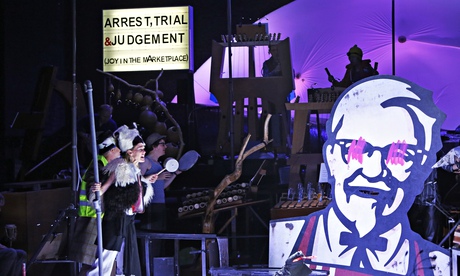
Heiner Goebbels has been a regular visitor to the Edinburgh festival since the 1990s; a succession of his unique music-theatre hybrids, from Black on White in 1997 onwards, have had their British premieres there. But his latest visit was the most extraordinary yet – the staging of Delusion of the Fury, Harry Partch's only completed opera, which Goebbels created last year with Ensemble musikFabrik as part of his three-year directorship of the Ruhrtriennale.
Though he is regularly cited as one of the great mavericks of 20th-century American music, Partch has remained an unknown quantity for audiences on this side of the Atlantic. That's largely owing to the purely practical challenge of performing his work. Partch invented his own musical scale, creating 43 steps within each octave so that he could rid his music of what he regarded as the disaster of equal-tempered tuning. He then created one set of 27 instruments – now kept at the Harry Partch Institute in New Jersey – with which to play it. Since his death in 1974, international performances of the composer's more ambitious works have seemed more or less impossible.
For this production of Delusion of the Fury, however, musikFabrik commissioned painstakingly faithful copies of Partch's originals, with their fabulously exotic names such as chromelodeon, marimba eroica and cloud chamber bowls, and then the group set about learning how to play them. The instruments, some of them strikingly beautiful, also form much of the tiered set of Goebbels's ravishingly lit production, though he typically adds a few touches of his own: water runs down a series of channels to a pool centre stage throughout the 75-minute piece, and giant inflatable balloons loom out of the wings.
The piece itself is a dramatic chimera, grafting together two stories. One looks to a tragic Japanese Noh play about a ghost who meets his son and then encounters his own assassin. The other is an absurdist African folk tale about a woman who, looking for her lost child, quarrels with a deaf hobo until both are brought before a judge who turns out to be deaf, too. In a sense, though, the narrative details hardly matter, for Partch creates an otherworldly ritual of chanting and declamation, underpinned and punctuated by his plucked and struck instruments. It's a world whose strangeness and beauty are totally compelling. The music is often built from simple pulsing rhythms, but it also erupts into thrilling toccatas, which use all of the microtones at Partch's disposal, and which the musikFabrik players deliver with scarcely believable virtuosity.
Perhaps the dramatic pacing is occasionally a bit on the slow side, especially in the second part, but the performances never flag, with musikFabrik forming the chorus with as much assurance as they play their instruments. As the work goes on, they create a world that owes as much to Goebbels's visual imagination and dramatic instincts as it does to Partch's vision of what music theatre should be. Sometimes in Delusion of the Fury it's hard to know where Partch ends and Goebbels begins, and that's a mark of how successful this show is in making this extraordinary piece live on the stage.

